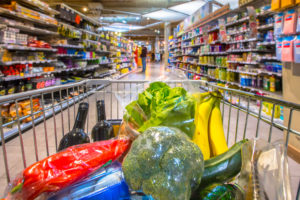 Kansas Gov. Laura Kelly announced in November her plans to introduce a bill to the Kansas legislature to “Axe the Food Tax” and completely eliminate sales tax on groceries in the state. Her plan is for the bill to be introduced during the 2022 legislative session.
Kansas Gov. Laura Kelly announced in November her plans to introduce a bill to the Kansas legislature to “Axe the Food Tax” and completely eliminate sales tax on groceries in the state. Her plan is for the bill to be introduced during the 2022 legislative session.
Kansas is currently one of just seven states in the U.S. that fully taxes groceries. The current grocery sales tax rate is 6.5%, the second highest in the nation.
Keep reading to learn more about why the governor wants to axe the food tax and what this will look like for Kansas citizens.
The Negative Side Effects Of Grocery Sales Tax
While a grocery sales tax can lead to economic growth and more money for the state government, there can be negative effects for the citizens, specifically those in lower economic classes.
Sales tax on groceries can cause harm to citizens in the lowest income bracket since they usually spend more of their income on groceries to eat at home than higher income individuals and families.
According to an article from the Center on Budget and Policy Priorities, “The lowest-income fifth of families spend almost twice the share of their annual income on food at home that the highest-income fifth do: 10.3 percent versus 5.7 percent.”
A study titled, “Putting grocery food taxes on the table: Evidence for food security policy-makers” found that states with a grocery tax tended to have a higher food insecurity rate.
While 10.9% of Americans are food insecure, 12.1% of Kansans are food insecure. The rate among Kansas children is 17.1%, while the national average is 14.6%.
Another study published in the Health Economic Review highlights the relationship between grocery sales tax and obesity, specifically throughout the pandemic. They estimate that the increased financial burden of obesity and diabetes rates resulting directly from grocery taxes is about $5.9 billion.
Also, though it may seem like getting rid of the grocery sales tax would lead to less money for the state, many people who live near the border in Kansas currently cross over to Missouri, Colorado or Nebraska to buy their groceries to avoid Kansas’ high grocery tax, leading to less money being spent in the state. The new “Axe the Food Tax” legislation will help put an end to that, resulting in higher sales for companies that sell food in Kansas.
Kansas Governor’s Plan For The State
Due to the negative aspects of a grocery sales tax, Gov. Kelly has stated she wants to completely remove the tax on foods in Kansas. With this cut the average four-person Kansas household should be able to save $500 or more a year.
Kansas lawmakers from both parties welcomed new revenue forecasts that project a $2.89 billion surplus to the state general fund as evidence the state can afford to exempt groceries from the state sales tax.
Gov. Kelly agreed that removing grocery sales tax shouldn’t have too much of an effect on the state’s budget.
“Thanks to the fiscally responsible decisions we made before and during the pandemic, we can cut the food sales tax and keep Kansas’ budget intact.”
Do You Need Help With Your Sales Tax Compliance?
If you have questions about your tax liability or any other state sales tax compliance questions, please contact us today. We’re happy to clarify any multi-state tax issues you’re trying to navigate.


















